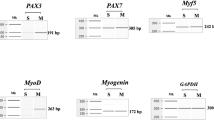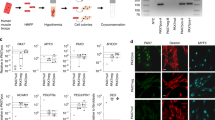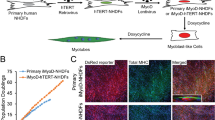Abstract
THE muscular dystrophies are a group of hereditary disorders manifested by a progressive wasting of the skeletal muscles. In spite of extensive studies, the nature of the primary lesion is unknown (for review see ref. 1). Because of the complex interaction between tissues, it is difficult to study this question in vivo. Therefore attempts have been made to investigate this question in cultures of dystrophic muscles of human or animal origin. Tissue explants as well as monolayer primary cell cultures contain, in addition to the myogenic cells, a heterogeneous cell population, the composition of which might differ in normal and dystrophic muscle cultures. It is difficult in such experiments to distinguish between properties intrinsic to the myogenic cells and effects exerted by other cell types. Indeed, previous experiments have yielded conflicting conclusions2–6. We therefore tested the possibility of obtaining cell cultures consisting of pure populations of myogenic cells obtained from dystrophic muscles. The present report describes the isolation of a cloned population of such cells, derived from adult dystrophic mouse muscle, that can proliferate and differentiate in cell culture.
This is a preview of subscription content, access via your institution
Access options
Subscribe to this journal
Receive 51 print issues and online access
$199.00 per year
only $3.90 per issue
Buy this article
- Purchase on Springer Link
- Instant access to full article PDF
Prices may be subject to local taxes which are calculated during checkout
Similar content being viewed by others
References
Appenzeller, O. Arch. Neurol. 32, 2–4 (1975).
Askanas, V., Shapin, S. A. & Milhorat, A. Arch. Neurol. 24, 259–265 (1971).
Bishop, A., Gallup, B., Sklate, Y. & Dubowitz, V. J. neur. Sci. 13, 333 (1971).
Parsons, R. Nature 251, 621–622 (1974).
Gallup, B. & Dubowitz, V. Nature 243, 287–289 (1973).
Powell, J. A. Expl Cell Res. 80, 251–264 (1973).
Michelson, A. M., Russell, E. S. & Harman, P. J. Proc. natn. Acad. Sci. U.S.A. 41, 1079–1084 (1955).
Yasin, R., Van Beers, G., Bulien, D. & Thompson, E. J. Expl Cell Res. 102, 405–408 (1976).
Yaffe, D. in Tissue Culture: Methods and Applications (eds P. F. Kruse & M. K. Patterson) 106–114 (Academic, New York, 1973).
Yaffe, D. Proc. natn. Acad. Sci. U.S.A. 61, 477–483 (1968).
Shainberg, A., Yagil, G. & Yaffe, D. Devl Biol. 25, 1–29 (1971).
Reporter, M. C., Konigsberg, I. R. & Strehler, B. L. Expl Cell Res. 30, 410–417 (1963).
Richler, C. & Yaffe, D. Devl Biol. 23, 1–22 (1970).
Yaffe, D. & Saxel, O. Differentiation 7, 159–166 (1977).
Author information
Authors and Affiliations
Rights and permissions
About this article
Cite this article
YAFFE, D., SAXEL, O. Serial passaging and differentiation of myogenic cells isolated from dystrophic mouse muscle. Nature 270, 725–727 (1977). https://doi.org/10.1038/270725a0
Received:
Accepted:
Published:
Issue Date:
DOI: https://doi.org/10.1038/270725a0
This article is cited by
-
Anti-apoptotic protein Bcl-2 contributes to the determination of reserve cells during myogenic differentiation of C2C12 cells
In Vitro Cellular & Developmental Biology - Animal (2024)
-
Myogenic differentiation of human myoblasts and Mesenchymal stromal cells under GDF11 on Poly-ɛ-caprolactone-collagen I-Polyethylene-nanofibers
BMC Molecular and Cell Biology (2023)
-
DNA-PKcs regulates myogenesis in an Akt-dependent manner independent of induced DNA damage
Cell Death & Differentiation (2023)
-
Continuous fish muscle cell line with capacity for myogenic and adipogenic-like phenotypes
Scientific Reports (2023)
-
Filamin A cooperates with the androgen receptor in preventing skeletal muscle senescence
Cell Death Discovery (2023)
Comments
By submitting a comment you agree to abide by our Terms and Community Guidelines. If you find something abusive or that does not comply with our terms or guidelines please flag it as inappropriate.



